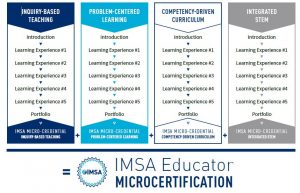Program Overview
The Illinois Mathematics and Science Academy offers educators in Illinois and across the globe a MicroCertification as an IMSA Educator. The Educator MicroCertification Program requires educators to be trained in IMSA’s four core competencies and qualifies individuals to present IMSA Professional Development and programming throughout their area.
- INQUIRY-BASED TEACHING & LEARNING – promotes analytic thinking, knowledge generation and application, and construction of meaning through mindful investigation driven by compelling questions that engage the learner’s curiosity.
- PROBLEM CENTERED TEACHING & LEARNING – provides experiences in which learners grapple with complex, meaningful, open-ended problems of our world. Learners provide potential evidence-based solutions or responses to these problems.
- COMPETENCY-DRIVEN TEACHING & LEARNING – enable students (1) to acquire strong bases of disciplinary content knowledge and skills; (2) to use the ideas, processes, and tools of the disciplines for the acquisition and generation of new knowledge; and (3) to apply knowledge when addressing issues and solving real-world problems.
- INTEGRATIVE TEACHING & LEARNING – forge meaningful connections of concepts, constructs, and principles within and across academic subjects and real-world situations.
The Educator MicroCertification Program is comprised of four micro-credentials representing IMSA’s four core competencies. Educators can complete the micro-credentials individually or as part of a structured program. Each micro-credential consists of an introductory course, 5 Learning Experiences, and a portfolio highlighting understanding and application. Educators who complete all four micro-credentials are awarded the MicroCertification as an IMSA Educator. The micro-credentials include:

.


